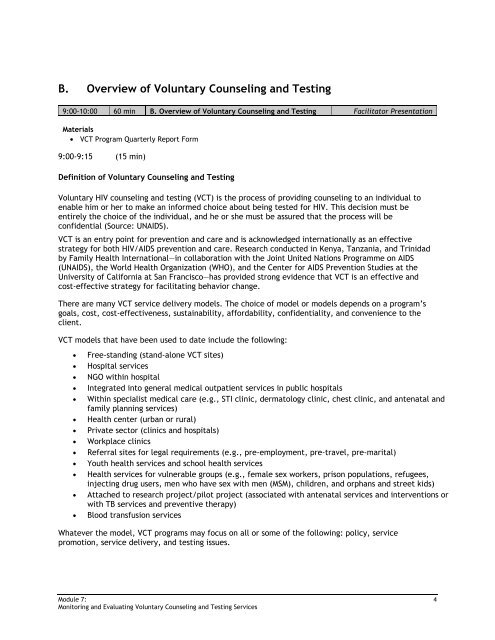Monitoring HIV/AIDS Programs: A Facilitator's Training Guide ...
Monitoring HIV/AIDS Programs: A Facilitator's Training Guide ...
Monitoring HIV/AIDS Programs: A Facilitator's Training Guide ...
You also want an ePaper? Increase the reach of your titles
YUMPU automatically turns print PDFs into web optimized ePapers that Google loves.
B. Overview of Voluntary Counseling and Testing<br />
9:00-10:00 60 min B. Overview of Voluntary Counseling and Testing Facilitator Presentation<br />
Materials<br />
• VCT Program Quarterly Report Form<br />
9:00-9:15 (15 min)<br />
Definition of Voluntary Counseling and Testing<br />
Voluntary <strong>HIV</strong> counseling and testing (VCT) is the process of providing counseling to an individual to<br />
enable him or her to make an informed choice about being tested for <strong>HIV</strong>. This decision must be<br />
entirely the choice of the individual, and he or she must be assured that the process will be<br />
confidential (Source: UN<strong>AIDS</strong>).<br />
VCT is an entry point for prevention and care and is acknowledged internationally as an effective<br />
strategy for both <strong>HIV</strong>/<strong>AIDS</strong> prevention and care. Research conducted in Kenya, Tanzania, and Trinidad<br />
by Family Health International—in collaboration with the Joint United Nations Programme on <strong>AIDS</strong><br />
(UN<strong>AIDS</strong>), the World Health Organization (WHO), and the Center for <strong>AIDS</strong> Prevention Studies at the<br />
University of California at San Francisco—has provided strong evidence that VCT is an effective and<br />
cost-effective strategy for facilitating behavior change.<br />
There are many VCT service delivery models. The choice of model or models depends on a program’s<br />
goals, cost, cost-effectiveness, sustainability, affordability, confidentiality, and convenience to the<br />
client.<br />
VCT models that have been used to date include the following:<br />
• Free-standing (stand-alone VCT sites)<br />
• Hospital services<br />
• NGO within hospital<br />
• Integrated into general medical outpatient services in public hospitals<br />
• Within specialist medical care (e.g., STI clinic, dermatology clinic, chest clinic, and antenatal and<br />
family planning services)<br />
• Health center (urban or rural)<br />
• Private sector (clinics and hospitals)<br />
• Workplace clinics<br />
• Referral sites for legal requirements (e.g., pre-employment, pre-travel, pre-marital)<br />
• Youth health services and school health services<br />
• Health services for vulnerable groups (e.g., female sex workers, prison populations, refugees,<br />
injecting drug users, men who have sex with men (MSM), children, and orphans and street kids)<br />
• Attached to research project/pilot project (associated with antenatal services and interventions or<br />
with TB services and preventive therapy)<br />
• Blood transfusion services<br />
Whatever the model, VCT programs may focus on all or some of the following: policy, service<br />
promotion, service delivery, and testing issues.<br />
Module 7: 4<br />
<strong>Monitoring</strong> and Evaluating Voluntary Counseling and Testing Services















